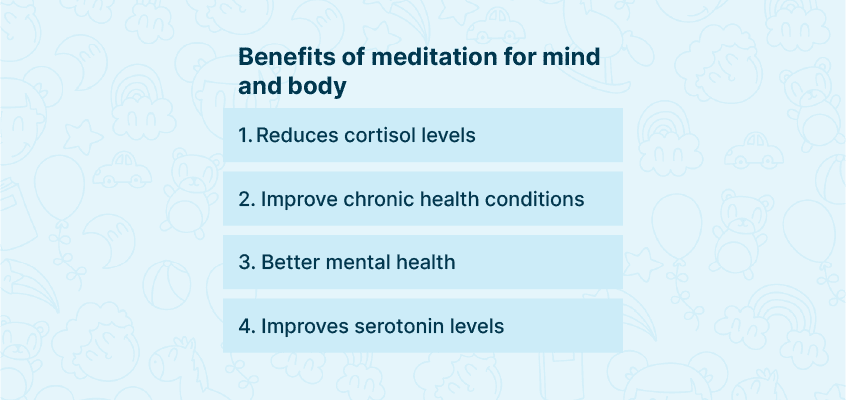Introduction
In our fast-paced life, many factors contribute to high-stress levels. Stress not just affects mental health but also impacts physical well-being. Meditation is a thousand-year-old practice that is known to reduce stress levels. It may be challenging to find time for meditation with a busy lifestyle and hectic routines. Here’s how you can reduce your stress with 10-minute meditation sessions.
Our Wellness Programs
What is a 10-minute meditation?
Stressors are everywhere. From office calls to the pressures of meeting deadlines, stress and anxiety always affect mental health. As suggested by researchers, stress is a culprit that triggers a fight or flight response and makes you overwhelmed even when the smallest of stressors are present. These stress responses make us vigilant and hyperactive. Meditation is a proven way to calm the mind to reduce stress and tension. It also shows relaxing effects on the body.
Regular meditation practice helps reverse the ill effects of stress on your mind and body. It lowers the intensity of stress-causing thoughts by making people aware of their distorted thinking. Redirecting thoughts to pay more attention to the self drops the negative thought patterns. A 10-minute meditation is a quick and effective way to relax our mind and body and reduce emotional distress.

Looking for services related to this subject? Get in touch with these experts today!!
Experts

Neelam Parwani

India
Life Coach
Experience: 5 years

Mansi Chawla

India
Psychologist
Experience: 12 years

Sapna Zarwal

India
Psychologist
Experience: 19 years

Deepti Gandhi

India
Life Coach
Experience: 6 years

Zabby Sharma

India
Life Coach
Experience: 11 years

Ritu Singh

India
Life Coach
Experience: 16 years
Tips for starting a meditation practice
Before starting meditation, here are some tips every beginner should know:
- Morning meditation: We can best experience meditation in the morning. It helps to make a fresh start to the day.
- Stick to the same time: Even if slotting time for meditation in the morning is impossible, try to stick to the same time and place to meditate every day. It helps to promote a good habit by forming a routine.
- There is no need to sit in a specific position: Meditation has many stereotypes. Many people believe that sitting on the floor in a yoga pose or the cross-leg position is the only way to meditate. However, the only thing that matters is to find a comfortable sitting position. Sitting in any comfortable place with an upright back is good enough to start meditation.
- Choose comfortable clothing: It is essential to wear comfortable clothing during meditation. Avoid tight-fitted clothes, belts, and any accessories that may cause discomfort.
How to meditate?
There are many types of meditations. Mindfulness meditation is associated with redirecting attention from stressors to the current state of mind. In mindfulness meditation, people learn to be in the present moment by shifting their attention.
To start with meditation, choose the desired time and comfortable space. If possible, try to practice meditation when there is no stress. It will help you focus more quickly than when facing a stressful situation.
- Sit in an upright, comfortable position.
- Take deep breaths and slowly close your eyes.
- Try to focus on your breath rather than thoughts.
- Pay attention to how the body feels while inhaling and exhaling.
- Mindfulness techniques help you to become more aware of yourself.
- Meditation can be guided or unguided. Don’t be harsh on yourself to attain stillness of thoughts.
- Slowly open the eyes when done.
Benefits of meditation for mind and body
Meditation is a thousand years old practice to attain calmness of mind. It offers numerous benefits as listed below:
- Reduces cortisol levels: Your body has high cortisol levels whenever faced with stressful situations. Meditation helps lower cortisol levels in the body and has a relaxing effect.
- Improve chronic health conditions: Chronic stress can worsen physical conditions such as GERD, irritable bowel syndrome, inflammation, PTSD. Regular meditation can improve your well-being by regulating your emotions.
- Slows brain ageing: Research suggests that daily meditation can help to fight age-related memory loss and keep your brain younger. Meditation enhances productivity resilience and improves the connection between your mind and body.
- Better mental health: 10-minute meditation promotes better mood by lowering stress and anxiety. It is a great way to break negative thinking patterns by enhancing awareness. With mindfulness practice, you experience better focus, attention, memory, and emotional stability.
- Promotes empathy: 10-minute meditation fosters a sense of compassion and kindness. Meditation helps to nurture awareness for self and others.
- Reduces rumination: OCD can contribute to rumination and high anxiety levels. Meditation reduces ruminating thoughts and relieves anxiety. It also helps with insomnia.
- Improves serotonin levels: Serotonin is a kind of neurotransmitter that stabilises your mood and promotes happiness. Meditation is known to improve serotonin levels and overall mental health.
- Breaker of bad habits: Mindfulness meditation is beneficial to those who wish to break bad habits like drinking alcohol, smoking, and emotional eating habits.
- Boosts self-confidence: Meditation helps to create a positive self-image and increases self-confidence. It is also beneficial to people who are struggling with depression.
How 10-minute meditation helps to reduce stress?
For a beginner, 10-minute meditation is an excellent way to reduce stress. Meditation promotes serotonin levels in the body that regulate mood, sleep, digestion, and overall happiness. Scientific studies suggest that meditation can lower cortisol, a stress hormone in your body. High levels of cortisol can affect your physical as well as mental health.
Stress is a culprit that may interfere with insulin mechanism, blood pressure, heart rate, and cardiovascular functionality. Stress also weakens your body’s immune response by making you more susceptible to falling sick. With just a 10-minute meditation session, you can experience noticeable changes in your overall well-being and quality of life.
Conclusion
In a nutshell, meditation offers many benefits that bring a sense of harmony and balance. With just 10 minutes of meditation, you can enjoy sound physical and mental health. Starting with a daily routine of 10-minute meditation, you can also gradually increase the duration to 20 or 30 minutes. You can find more resources on mindfulness meditation at unitedwecare.com.

















